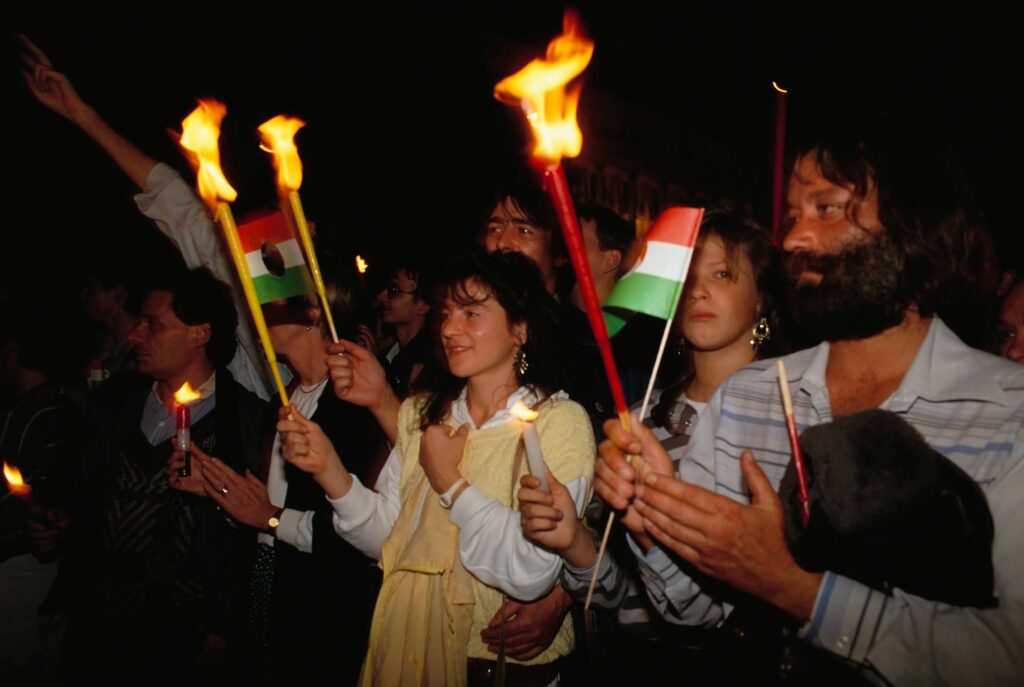Hungarians commemorate and celebrate the 1956 Hungarian uprising as a national holiday. 23 October was declared a national holiday in 1989. Most of us are not old enough to have our personal memories of those times. What is this holiday about? What do we celebrate and what actually happened on 23 October? Let us take a brief look at the story.
The roots of the events go back to World War II when Hungary, an ally of Nazi Germany, participated in the invasion of the Soviet Union. After World War II the Soviet Army occupied Hungary, and the country came under the Soviet Union’s sphere of influence. Hungary became a communist state under the severely authoritarian leadership – we could say dictatorship – of Mátyás Rákosi. From 1945 on the Hungarians were under the control of Moscow. All wealth of whatever nature was taken from Hungary by the Russians who showed their power by putting thousands of Russian troops and hundreds of tanks in the country. The people were ruled over with a rod of iron by Communist Russia and anybody who challenged the rule of Stalin and Russia paid the price. But Hungarians hated Russian control, especially the secret police called the ÁVH, the Russian control of the economy, which had made Hungary poor and the Russian control of what the schools taught and the censorship and the lack of freedom.
On October 23rd 1956 – as a spontaneous nationwide revolt against the government of the Hungarian People’s Republic and its Soviet-imposed policies – students and workers took to the streets of Budapest. Approximately 20,000 protesters convened around the statue of József Bem—a national hero of Poland and Hungary. They issued their Sixteen Points which included personal freedom, more food, the removal of the secret police, the removal of Russian control etc. After the students read their proclamation, the crowd chanted a censored patriotic poem the “National Song”, which refrains: “This we swear, this we swear, that we will no longer be slaves.” Someone in the crowd cut out the Communist coat of arms from the Hungarian flag, leaving a distinctive hole and others quickly followed suit. The revolt attracted thousands as they marched through central Budapest to the Parliament building, calling out on the streets using a van with loudspeakers via Radio Free Europe.Some demonstrators decided to carry out one of their demands, the removal of Stalin’s 30-foot-high (9.1 m) bronze statue that was erected in 1951 on the site of Marianum church, which was demolished to make room for the monument. By 21:30, the statue was toppled and crowds celebrated by placing Hungarian flags in Stalin’s boots, which was all that was left of the statue.
A student delegation, entering the radio building to try to broadcast the students’ demands, was detained. When the delegation’s release was demanded by the demonstrators outside, they were fired upon by the State Security Police (ÁVH) from within the building. When the students were fired on, a student died and was wrapped in a flag and held above the crowd. This was the start of the revolution. As the news spread, disorder and violence erupted throughout the capital.
The revolt spread quickly across Hungary and the government collapsed. Thousands organised into militias, battling the ÁVH and Soviet troops. Pro-Soviet communists and ÁVH members were often executed or imprisoned and former political prisoners were released and armed. Imre Nagy was appointed prime minister and János Kádár foreign minister. The new government formally disbanded the ÁVH, declared its intention to withdraw from the Warsaw Pact, and pledged to re-establish free elections. By the end of October, fighting had almost stopped and between 28 October and 4 November a sense of normality began to return to the country.For five days, there was freedom in Hungary. The new Hungarian government introduced democracy, freedom of speech, and freedom of religion. Cardinal Mindszenty, the leader of the Catholic Church, was freed from prison. But it didn’t last long.After announcing a willingness to negotiate a withdrawal of Soviet forces, the Soviet Union changed its mind and moved to crush the revolution. On 4 November, a large Soviet force invaded Budapest and other regions of the country. 1,000 Russian tanks rolled into Budapest, they destroyed the Hungarian army and captured the building of the Hungarian Radio. The last words broadcast from there were “Help! Help! Help!”. The Hungarian resistance continued until 10 November. People – even children – fought the Russian troops with machine guns. Over 2,500 Hungarians and 700 Soviet soldiers were killed in the conflict, and 200,000 Hungarians fled as refugees. Mass arrests and denunciations continued for months afterwards. Eventually 26,000 people were brought before the Hungarian courts, 22,000 were sentenced, 13,000 imprisoned, and several hundred executed. Hundreds were also deported to the Soviet Union, many without evidence. By January 1957, the new Soviet-installed government had suppressed all public opposition. The 1956 revolution lasted from 23 October until 10 November 1956. Only 19 days, but they determined the fate of Hungary for long years. People had to wait until 1989 to experience the long awaited freedom they had longed for so much.
Vocabulary
to commemorate | megemlékezni valamiről |
uprising | forradalom |
ally | szövetséges |
to occupy | elfoglalni |
wealth | gazdagság, vagyon |
troops | katonák |
to rule with a rod of iron | vaskézzel uralkodni |
to convene | összegyűlni, gyülekezni |
removal | eltávolítás |
proclamation | kiáltvány |
patriotic | hazafias |
to swear | esküdni |
slave | szolga, rabszolga |
coat of arms | címer |
to follow suit | követni |
to march | vonulni, masírozni |
loudspeaker | hangosbeszélő |
to erect | emelni, felállítani |
to topple | ledönteni |
to detain | letartóztatni, foglyul ejteni |
militia | nemzetőrség |
to execute | kivégezni |
to imprison | bebörtönözni |
to arm | felfegyverezni |
to disband | feloszlatni |
to withdraw | kilépni |
to crush | összezúzni |
flee, fled, fled | elmenekülni |
refugee | menekült |
denunciation | feljelentés |
to sentence | elítélni |
opposition | ellenállás |
fate | sors |
long awaited | régóta várt |







